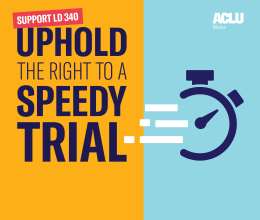A major bail reform bill, LD 1703, will move onto the House floor after receiving a majority vote (10 - 2) from the Judiciary Committee. LD 1703, sponsored by Rep. Rachel Talbot Ross (Portland), would eliminate cash bail for most Class E misdemeanors. These include the lowest level offenses such as drinking in public and criminal trespass.
The bill would also clarify rules for bail commissioners, judges and prosecutors to set bail and impose bail conditions. Among the changes, judicial officers would be required to consider how imposing bail would affect a person’s employment, primary caregiving responsibilities and access to medical care.
“Cash bail is one of the most unfair parts of our criminal system,” said Rep. Talbot Ross. “It creates two systems of justice: one for the wealthy, and one for everyone else. I’m grateful to my colleagues for taking this important step toward ending wealth-based discrimination in our legal system.”
Studies have found that defendants who can’t afford bail are more likely to be sentenced to longer jail or prison time. They are also more likely to take plea deals and plead guilty to crimes they did not commit. The practice of unaffordable cash bail disproportionately affects people experiencing homelessness, people of color and low-income people.
“Justice should not depend on how much money a person has,” said Meagan Sway, policy director at the ACLU of Maine. “Yet our broken bail system punishes poor Mainers with jail time even before they have had a chance to defend themselves in court. LD 1703 is an important step toward ensuring that everyone is treated equally before the law.”
The majority of people (60 – 80 percent) in Maine jails are there awaiting trial, and the majority of arrests every year are for misdemeanors. A 2015 survey of five jails by the Maine Judicial Branch found the average cash bail for Class E offenses was $722 and the average length of pretrial detention for Class E offenses was about a month (see Appendix C).








